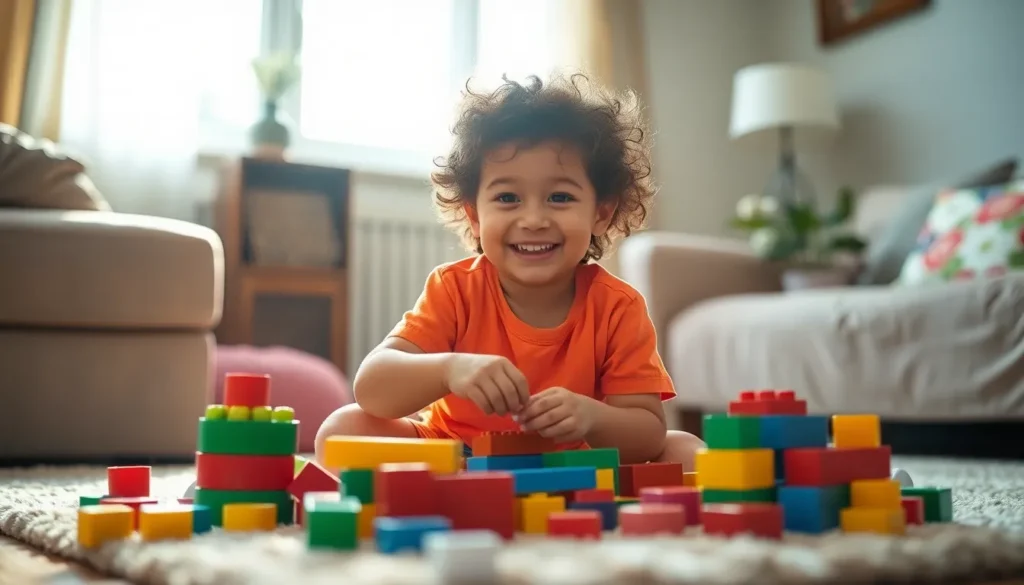Table of Contents
ToggleUnlocking the mysteries of child psychology is like trying to solve a Rubik’s Cube blindfolded—confusing yet fascinating. Every day, parents and educators grapple with the enigma of young minds, often feeling like they’re deciphering hieroglyphics. Understanding how children think, feel, and behave isn’t just for child psychologists; it’s essential for anyone who interacts with kids.
From tantrums that rival volcanic eruptions to giggles that could melt the iciest hearts, children offer a whirlwind of emotions and behaviors. By diving into the world of child psychology, one can gain valuable insights that turn chaos into clarity. So, whether you’re a parent, teacher, or just a curious adult, grasping the fundamentals of child psychology can transform your interactions and make navigating the ups and downs of childhood a whole lot smoother.
Understanding Child Psychology
Understanding child psychology involves examining the cognitive, emotional, and social development of children. Insights into how a child’s mind works can enable parents and educators to create effective strategies for support. Developmental stages, such as infancy, early childhood, and adolescence, play a vital role in shaping a child’s experiences and responses.
Cognitive development includes how children process information and solve problems. Jean Piaget’s theory of cognitive development outlines stages: sensorimotor, preoperational, concrete operational, and formal operational. Each stage characterizes specific cognitive abilities, influencing behavior and communication.
Emotional development in children affects how they express feelings and manage relationships. The attachment theory, proposed by John Bowlby, illustrates how early bonds with caregivers impact emotional security and social skills. Children with secure attachments often display healthier emotional regulation.
Behavioral patterns often correlate with environmental factors, such as family dynamics and cultural influences. Parenting styles—authoritative, authoritarian, permissive, and uninvolved—significantly influence child behavior and self-esteem. Research indicates that authoritative parenting, characterized by warmth and structure, yields the best outcomes.
Social development involves learning to interact with peers and adults. Social skills develop through play, communication, and shared experiences. Peer relationships contribute to self-identity and emotional growth. Encouraging positive relationships promotes healthy social development.
Recognizing signs of developmental delays aids in timely intervention. Early assessment tools help identify issues, enabling parents and educators to seek appropriate support. Understanding child psychology equips individuals with the skills to nurture and guide children’s growth effectively.
Key Concepts in Child Psychology

Child psychology encompasses various theories and concepts that provide insights into the developmental stages of children. Understanding these key concepts enhances the ability to support children’s emotional, cognitive, and social growth.
Theories of Child Development
Several influential theories explain child development. Jean Piaget’s theory highlights cognitive stages, such as sensorimotor and preoperational, which dictate how children interact with their environment. Erik Erikson’s stages of psychosocial development demonstrate the importance of social relationships across different life stages. Lev Vygotsky emphasizes the role of social interaction in cognitive development, suggesting that learning occurs within a social context. Each theory offers a unique perspective, allowing caregivers and educators to understand children’s behaviors and needs more effectively.
Importance of Cognitive Development
Cognitive development plays a crucial role in shaping children’s thinking and problem-solving skills. From ages two to seven, children enter the preoperational stage, marked by symbolic thinking and language acquisition. Advances in cognitive abilities directly relate to how children process information, influencing their decision-making skills. Engaging children in activities like puzzles, games, and storytelling fosters cognitive growth. Observing individual differences in learning approaches helps caregivers tailor experiences that optimize children’s cognitive development.
Factors Influencing Child Psychology
Understanding child psychology requires examining various factors that shape children’s development. Both genetic and environmental influences play crucial roles.
Genetic Factors
Genetics significantly affects a child’s emotional and cognitive traits. Specific genes can influence temperament, intelligence, and even susceptibility to mental health conditions. Research indicates that inherited traits impact a child’s natural disposition toward anxiety, mood stability, and social interactions. For instance, children may inherit a tendency toward extroversion or introversion from their parents. Genetic predispositions shape how children respond to stress and form relationships. Therefore, recognizing these inherited characteristics can help caregivers tailor their approaches for optimal support.
Environmental Factors
Environment contributes meaningfully to child psychological development. Factors such as family dynamics, socio-economic status, and community influence experiences. Supportive environments foster healthy emotional growth, while adverse settings may lead to behavioral issues. For example, children raised in nurturing households tend to exhibit higher self-esteem and resilience. Additionally, exposure to diverse social situations enhances cognitive abilities and social skills. Environments rich in stimulation, like interactive play or educational activities, promote cognitive growth and emotional intelligence as well. Understanding these environmental impacts aids in forming effective strategies for child development.
Common Psychological Issues in Children
Children may experience a range of psychological issues that can affect their development and well-being. Understanding these challenges is crucial for caregivers and educators.
Anxiety Disorders
Anxiety disorders represent a common psychological issue among children. Symptoms often manifest as excessive worry, fear, or avoidance behaviors. Approximately 7% of children experience anxiety disorders, impacting daily functioning and social interactions. Separation anxiety, generalized anxiety disorder, and social anxiety are prevalent types. Symptoms might include crying, refusal to attend school, or physical complaints like stomachaches. Early identification and intervention play essential roles in alleviating anxiety. Providing support through therapy and coping strategies equips children with tools to manage anxiety effectively.
Behavioral Disorders
Behavioral disorders encompass a range of conditions characterized by disruptive behaviors. Attention-deficit/hyperactivity disorder (ADHD) and oppositional defiant disorder (ODD) frequently appear in children. ADHD affects around 5% of children, leading to inattentiveness, impulsivity, and hyperactivity. ODD manifests through defiant, disobedient tendencies toward authority figures. Behavioral issues can strain family relationships and hinder academic performance. Interventions commonly include behavioral therapy and parent training programs. Implementing consistent routines and clear expectations helps children navigate these challenges and promotes positive behavior changes.
Approaches to Supporting Child Development
Supporting child development involves various strategies that enhance learning and emotional growth. Two effective methods are positive reinforcement and play.
Positive Reinforcement Strategies
Positive reinforcement fosters desirable behaviors in children. Consistently rewarding achievements encourages them to repeat those actions. Examples include verbal praise, stickers, or extra playtime. When a child completes homework or helps with chores, immediate acknowledgment boosts their self-esteem. Parents and educators can use specific feedback to highlight efforts, like saying “I noticed how hard you worked on your drawing.” This strategy creates a strong association between positive behavior and rewarding outcomes, enhancing motivation and perseverance.
Role of Play in Learning
Play serves as a crucial avenue for children’s learning. Engaging in play allows children to explore their environment and practice new skills. Through pretend play, kids develop social skills, expand their vocabulary, and learn problem-solving techniques. Activities like building blocks stimulate creativity and enhance cognitive development. Additionally, group games foster teamwork and cooperation. Parents and educators can create opportunities for unstructured play, promoting independence and confidence. Prioritizing playtime helps children connect with their emotions while building crucial life skills.
Understanding child psychology is essential for fostering healthy development in children. By recognizing the intricate interplay of cognitive, emotional, and social factors, caregivers can create supportive environments that promote growth. Awareness of influential theories and the impact of parenting styles equips adults with the tools needed to navigate childhood challenges effectively.
Moreover, addressing common psychological issues early on can lead to better outcomes for children. Through positive reinforcement and engaging play, parents and educators can enhance learning and emotional well-being. Ultimately, a deeper understanding of child psychology empowers adults to nurture children’s unique needs, helping them thrive in a complex world.





